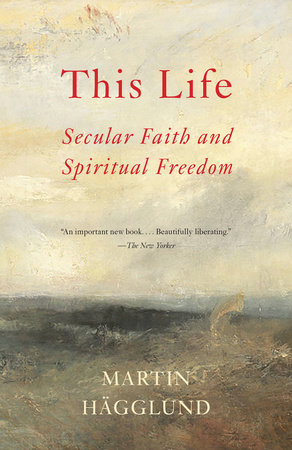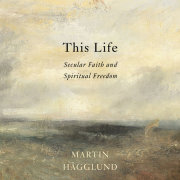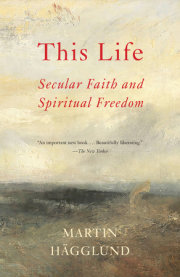FAITH I
He never knew it would feel like this. She had entered his life, transformed his world, opened his body and mind. Yet, throughout it all, he had told himself that his devotion to her did not compromise his devotion to God. “I had warned myself,” he recalls, “not to reckon on worldly happiness.” But it turns out that this is precisely what he did. He loved her, and because he loved her he is shattered by her death. For days and nights, he records “the mad words, the bitter resentment, the fluttering in the stomach, the nightmare unreality, the wallowed-in-tears.”
His pious friends tell him to take solace in God and in the words of Saint Paul: “Do not mourn like those who have no hope.” He comes to understand, however, that “what St. Paul says can comfort only those who love God better than the dead.” His faith in God would direct him toward an eternal life. But in loving her and in mourning her death, he is not comforted by his faith in God and eternity. He does not want to repose in eternal peace; he wants her to come back and their life together to go on, in the time and space of their shared existence. “The earthly beloved,” he writes, “incessantly triumphs over your mere idea of her. And you want her to; you want her with all her resistances, all her faults, all her unexpectedness. That is, in her foursquare and independent reality. And this, not any image or memory, is what we are to love still, after she is dead.”
The words belong to C. S. Lewis in his book
A Grief Observed, written after the death of his wife, Joy Davidman. While Lewis was one of the most influential Christian writers of his time,
A Grief Observed strikes a different tone. Rather than preach or instruct, Lewis seeks to describe what is happening to him in the experience of mourning, as he explores the pain and desperation of losing his beloved. What emerges through this account is not simply a crisis of faith, in the sense that the death of his wife makes him doubt the existence of God. What emerges is something deeper: an insight that his faith in God cannot offer any consolation for the loss of a loved one. If a mother is mourning the death of her child, Lewis writes, “she may still hope to ‘glorify God and enjoy him forever,’ ” which may be “a comfort to the God-aimed, eternal spirit within her. But not to her motherhood. The specifically maternal happiness must be written off. Never, in any place or time, will she have her son on her knees, or bathe him, or tell him a story, or plan for his future, or see her grandchild.”
In contrast to his religious faith in eternity, Lewis describes a passionate commitment to a finite life. The mother who is mourning her child, or the lover who is mourning his beloved, is devoted to a relationship that requires time to be what it is. Love is not something that can take place in an instant. Rather, love expresses a commitment to caring for another person across time. The temporality of such love is not merely an unavoidable condition; it is intrinsic to the positive qualities of being with the beloved. In loving another, one cherishes a projected future, the repetition of acts, and the ongoing time of living together. It is the end of such a temporal life that one mourns when the beloved is lost. And as Lewis makes clear, the hope for eternity is not a consolation. Even if the hope for eternity were fulfilled, it would not bring back the life they shared together:
Suppose that the earthly lives she and I shared for a few years are in reality only the basis for, or prelude to, or earthly appearance of, two unimaginable, supercosmic, eternal somethings. Those somethings could be pictured as spheres or globes. Where the plane of Nature cuts through them—that is, in earthly life—they appear as two circles (circles are slices of spheres). Two circles that touched. But those two circles, above all the point at which they touched, are the very thing I am mourning for, homesick for, famished for. You tell me, “[S]he goes on.” But my heart and body are crying out, come back, come back. Be a circle, touching my circle on the plane of Nature. But I know this is impossible. I know that the thing I want is exactly the thing I can never get. The old life, the jokes, the drinks, the arguments, the lovemaking, the tiny, heartbreaking commonplace. On any view whatever, to say, “H. is dead,” is to say “All that is gone.” It is a part of the past. And the past is the past and that is what time means, and time itself is one more name for death, and Heaven itself is a state where “the former things have passed away. . . .”
Unless, of course, you can literally believe all that stuff about family reunions “on the further shore,” pictured in entirely earthly terms. But that is all unscriptural, all out of bad hymns and lithographs. There’s not a word of it in the Bible.
Lewis here vividly articulates how the attachment to the beloved is expressed through a commitment to
living on with her. He cannot come to terms with the death of his wife because he wants their life together to continue, in the temporal rhythm and physical concreteness that gave their relationship its unique quality. Accordingly, he does not want them to be self-sufficient, timeless beings (what he describes as “two unimaginable, supercosmic, eternal somethings”). Rather, he wants them to be in need of each other, vulnerable and open to being transformed by the touch of the other. For the same reason, the promise of an eternal state of being cannot deliver what he desires. In the consummation of eternity—here described as a state of heaven where all “former things” have passed away in favor of eternity—there would be no time for their relationship to live on. Eternity would put an end to their time together and in such a state their love could not survive.
The commitment to his beloved that animates
A Grief Observed is therefore at odds with Lewis’s commitment to God. As a long-standing reader of Christian theology, he is well aware that he is not supposed to love mortal beings as ends in themselves but only as means toward the love of God. As he explains in
A Grief Observed: “If you’re approaching Him not as the goal but as a road, not as the end but as a means, you’re not really approaching Him at all.” This is why Lewis emphasizes that the Bible does not support visions of an afterlife that project reunions with the people you have loved throughout your life. Such visions are not directed toward God as the End, but at most treat God as a means for retrieving the mortal beloved. The vision of an afterlife where Lewis’s wife would welcome him is attached to living on with the beloved rather than to dwelling in the eternity of God.
Lewis thus illuminates my central distinction between
living on (prolonging a temporal life) and being
eternal (absorbed in a timeless existence). As he makes agonizingly clear, the former cannot be reconciled with the latter. In mourning his wife, Lewis loves her as an end in herself. He does not want anything beyond her; he wants her to return and their life as lovers to go on: “the jokes, the drinks, the arguments, the lovemaking, the tiny, heartbreaking commonplace.” This desire is committed to sharing a life that requires time to be what it is. In wanting his beloved to come back, an eternal life is not only unattainable but also
undesirable. He wants their relationship to live on, rather than to be absorbed in an eternal life.
One may ask here why the choice between living on and eternity has to be an either/or. Many popular conceptions of the afterlife assume that living on and being in eternity can be combined, allowing one to keep the positive qualities of life without the threat of losing them. Thus, in response to my argument, the prominent theologian Miroslav Volf has emphasized that Christian visions of eternity are better understood as visions of an
endless rather than a
timeless existence.8 Volf concedes that a timeless life would be meaningless, since there can be no experiences and no events without time. Nevertheless, he maintains that it would be desirable to live forever. In such an eternity, there would still be time, but none of the changes in time would be experienced as a negative loss. Rather, all forms of change would be experienced as an ongoing part of the divine good. The afterlife would thus enable one to live on with the beloved, in an experience of eternity that is untouched by the prospect of tragic loss.
My argument, however, is that an endless life is just as meaningless as a timeless one. The risk of tragic loss—the loss of your own life and the loss of what you love—is not a prospect that can be eliminated but an intrinsic part of why it matters what you do with your life. If you and your beloved did not believe that your lives were finite, neither one of you could take your lives to be at stake and there would be no urgency to do anything with your time. You could never care for yourselves, for one another, or for the commitment that you share, since you would have no sense of fragility. By the same token, you could feel no need to make an effort on behalf of the relationship, since you would have no apprehension that the other person could leave you or that your relationship could break down. The moments of profound intimacy would not be experienced as precious, but as the given state of things. You would expect everything to be settled, rather than dependent on your engagement and attention, as well as on the unforeseeable responses of your beloved. This is why living on with your beloved is incompatible with being in eternity, even on the level of the imagination. As soon as you remove the sense of finitude and vulnerability, you remove the vitality of any possible love relationship.
The sense of finitude reverberates in every aspect of your life. In living on, you always remain vulnerable by virtue of leading a temporal life. Living on does not protect you against the regret of having done something irreversible, the pain of not being able to fulfill a given ambition, or the heartbreak of being left by the one you love. Indeed, your world can break down precisely because you live on after the death of everything you love. This “death” can be much more painful and fearful than the prospect of your own death, not least because it is a death that you have to survive.
Hence, as long as you are attached to someone or something that you can lose, you are susceptible to suffering. To attain a peaceful state of eternity you must be liberated from the risk of losing what you love. Were such liberation possible, however, nothing would matter to you. You literally
would not care. There would be no urgency to do anything or maintain love for anyone, since nothing of value could be lost. You could not even be motivated to sustain a single activity, since it would not count as a loss for you if you did not engage in the activity.
The passion and pathos of living with your beloved are therefore incompatible with the security of an eternal life. The sense of something being unique and irreplaceable is inseparable from the sense that it
can be lost. This relation to loss is inscribed in the very form of living on. To live on is never to repose in a timeless or endless presence. Rather, to live on is to remain after a past that has ceased to be and before an unpredictable future that may not come to be.
The precarious experience of time is not only a negative peril but also the positive possibility of coming into being, living on, and being motivated to act. The motivation to undertake any form of project—to sustain a commitment, to pursue a course of action—requires that the project be precarious: that it not be given as a fact but must be upheld by conviction and fidelity. You have to believe in the value of the project, but you also have to believe that the project may cease to be and needs to be sustained. Thus, when you love someone, that love exists only insofar as you sustain it. Your love is not given as a fact but is something that has to be achieved and—once achieved—has to be maintained and developed. This project requires that you believe in the value of the love, but it also requires that you believe that the love can be lost and solicits you to care.
Copyright © 2019 by Martin Hägglund. All rights reserved. No part of this excerpt may be reproduced or reprinted without permission in writing from the publisher.






